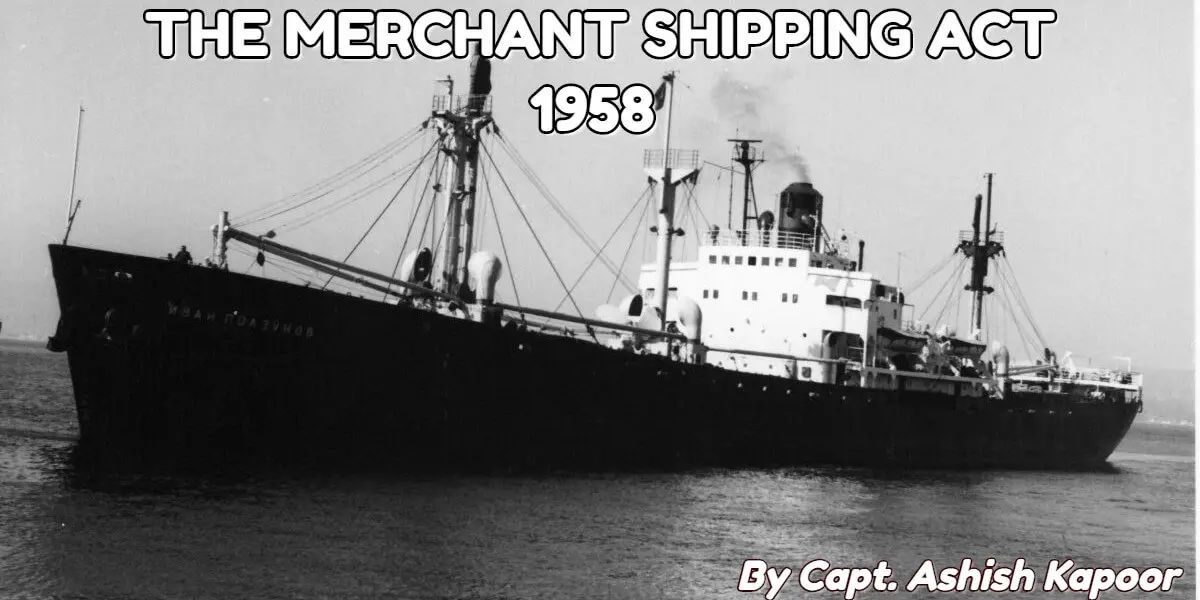Q.) What are the provisions of the MERCHANT SHIPPING ACT 1958 regarding certificate of registry with respect to :
- Custody & use of Certificate
- Change of Master or Owner
- Defaced or lost Certificate
- Ships purchased/constructed for an Indian owner
- Alteration of ship affecting her tonnage & description
1) CUSTODY AND USE OF CERTIFICATE:
The Certificate of registry is to be used only for the lawful navigation of the ship and is not to be detained by any owner or mortgagees. The Certificate shall remain in the custody of the person in charge of the lawful navigation of the ship so that he may produce it as and when required by the registrar, custom collector or other person where required by the law. In case, any person having unlawful possession of the COR refuses to hand it over ,such a person can be summoned by a magistrate and if the person absconds or refuses to deliver such certificate the magistrate shall certify the facts and the certificate shall be treated as lost, defaced, for purpose of issue of a new certificate.
2) CHANGE OF MASTER OR OWNER:
The change of master of an Indian ship has to be endorsed on the certificate of registry by the following as the case may be:
In case the master has been removed by a Marine board or court, then the Presiding officer shall endorse the change.
IN ALL OTHER CASES,
An application is made by the owner to the registrar, who, in turn, issues a letter stating new person appointed as Master. A copy of this letter is sent to the ship which may be Attached to COR.
Previously the following procedure was carried out:
- The change of master is to be endorsed on the Certificate of registry by the Registrar or any other person authorized by the Central Government at the port where the change is made.
- The endorsement is made by the Indian Consular officer at the port of change if the change is made outside India.
Any Custom Collector at any port in India may refuse to Permit any person to act as master of an Indian Ship if his name is not endorsed on the COR as the last appointed Captain of the ship.
The Change Of Owner has to be endorsed on COR by the Registrar at the ship’s port of Registry or by Registrar of another port where the ship may be, who has been advised of the change by the registrar of ship’s port of Registry.
The Master is responsible for handing over the certificate of registry to the Registrar for endorsement of change of owner & if he does not do so, the fine is Rs 1000/-.
3) DEFACED OR LOST CERTIFICATE:
When the certificate of Registry is defaced, it should be submitted to the registrar for the issue of a new certificate in lieu of the original. If the certificate is lost, the ship’s registrar shall grant a new certificate. If the certificate is lost, while the ship is at any port other than an Indian port, then the master or any other knowledgeable person should make a declaration stating the facts and the name of the owners to the nearest Indian consular officer who may issue a provisional certificate stating the circumstances under which it has been issued. The provisional certificate shall be delivered to the registrar at the ships port of registry within 10 days of the ships arrival in India and the registrar shall grant a new certificate of registry. If the lost certificate is found then it must be surrendered to the registrar at the ships port of registry for cancellation.
4) SHIPS PURCHASED / CONSTRUCTED ABROAD:
In case a ship becomes entitled to become an Indian ship at a port outside India, her master shall apply to the nearest Indian consular officer who may issue a provisional certificate stating the particulars of the ship and he shall also forward a copy to the D.G shipping. The validity of such a certificate is 6 months or until the ship arrives at an Indian port having a registrar of ships.
5) ALTERATION OF THE SHIP AFFECTING HER TONNAGE AND DESCRIPTION:
When a registered ship is so altered that she does not correspond to her tonnage or description as entered on the certificate of registry, the registrar at that port or the first port at which the ship arrives shall, on application being made to him stating the particulars of alterations made, either cause the alteration to be registered or direct that the ship be registered anew. The registrar may indicate the alteration on the existing certificate or issue a new certificate after retaining the old certificate of registry. In case the above is done by a registrar who is not the registrar of the ships port of registry, he shall forward the particulars of alteration or the old certificate as the case may be to the registrar at the ships port of registry for the entry to be made in the registry book. If a provisional certificate by Indian consular officer is issued then all the details are to be forwarded to the registrar at ships port of registry.

Leave a Reply